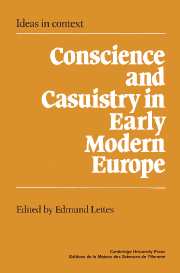Book contents
- Frontmatter
- Contents
- Notes on contributors
- Introduction
- 1 Governing conduct
- 2 Laxity and liberty in seventeenth-century English political thought
- 3 Casuistry and character
- 4 Prescription and reality
- 5 The ‘new art of lying’: equivocation, mental reservation, and casuistry
- 6 Kant and casuistry
- 7 Moral arithmetic: Seven Sins into Ten Commandments
- 8 Optics and sceptics: the philosophical foundations of Hobbes's political thought
- Index
Introduction
Published online by Cambridge University Press: 13 October 2009
- Frontmatter
- Contents
- Notes on contributors
- Introduction
- 1 Governing conduct
- 2 Laxity and liberty in seventeenth-century English political thought
- 3 Casuistry and character
- 4 Prescription and reality
- 5 The ‘new art of lying’: equivocation, mental reservation, and casuistry
- 6 Kant and casuistry
- 7 Moral arithmetic: Seven Sins into Ten Commandments
- 8 Optics and sceptics: the philosophical foundations of Hobbes's political thought
- Index
Summary
The contributors to this volume are philosophers, historians, and political theorists from Great Britain, Canada, the United States, Australia, France, and Germany. In spite of the diversity of disciplines and national traditions, their contributions show a remarkable convergence on three themes: changes in the modes of moral education in early modern Europe, the emergence of new relations between conscience and law (particularly the law of the state), and the shared continuities and discontinuities of both Roman Catholic and Protestant moral culture in relation to their medieval past.
The late nineteenth-century American historian Henry Charles Lea saw the history of conscience in early modern Europe as the liberation of conscience in Protestant lands from the authority of priests and casuists, who had built their power upon ‘the weakness of those unable to bear their burdens, unable to trust themselves’. A number of contributors to this volume, however, question whether the early modern period did see the emergence of new practices and ideas which ‘freed’ the individual conscience from social and political control. In the first chapter James Tully argues that a new practice of governing conduct was formed in the early modern era which was a direct attack upon conscience, its aim being the creation of habits that would replace conscience as a governing element of action. He relies largely, but by no means exclusively, on a wide variety of works by John Locke to describe the new constellation of moral ideas and practices, which he calls ‘penal’.
- Type
- Chapter
- Information
- Conscience and Casuistry in Early Modern Europe , pp. 1 - 11Publisher: Cambridge University PressPrint publication year: 1988
- 1
- Cited by

